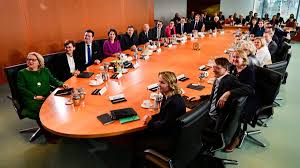The German government on Wednesday approved the creation of a National Security Council (NSC) to strengthen coordination of security policy and enable faster decision-making during crises.
The new body will also draft long-term strategies to address potential threats while adopting a networked approach to national security.
Modeled on similar institutions in the United States and Britain, the council will be chaired by Chancellor Friedrich Merz. It is to include key ministers as well as representatives from allied countries and organisations such as the European Union and NATO.
Following the Cabinet decision, Merz described the NSC as “a central platform for overarching security issues” and a key element of Germany’s cohesive security policy.
“Security is high on the political agenda,” the chancellor said, stressing that the council’s establishment was a strong signal to citizens and NATO allies.
He noted that while the idea of a National Security Council had been debated in Germany for three decades, his government approved it “after just a few months in office.”
Merz linked the decision to rising threats from Russia, accusing Moscow of conducting hybrid attacks, including “massive interference” in German democracy and targeted assaults on IT infrastructure.
At the same meeting, held at the Ministry of Defence, the Cabinet also endorsed plans to introduce a voluntary military service.
(dpa/NAN)


